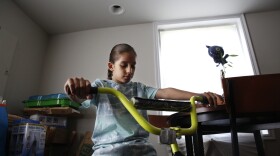You don't have to be a couple's counselor to know outside stress can hurt relationships. If you have a bad day at work or get caught in traffic on your way home, you might wind up grumpy and less patient with your significant other.
But when researchers at UT Austin started looking into how feelings of tension caused by the COVID-19 pandemic was affecting couples, they discovered something surprising: Couples who blamed the pandemic for their stress were happier than those who didn’t.
That’s probably because not all stress is equal, study co-author Lisa Neff said.
“When the pandemic hit, we all knew why we were stressed,” Neff, an associate professor of human development and family sciences at UT, said. “It was a very clear, stressful circumstance that we could point to to explain why we were feeling these anxieties.”
Neff said that allowed some couples to stop blaming each other for everyday irritations and blame the pandemic instead.
"So let's unite and join forces to try to overcome this difficult time we're experiencing," she said.
The researchers asked around 200 people to complete surveys every night before bed. Those surveys gauged the participants' stress levels, to what they attributed that stress, and recorded their attitudes and interactions with their partners.
The results showed relationships suffered during days when participants felt more stress. But the impact on relationships was muted among those who blamed their stress on COVID 19.
Some research shows similar reactions among couples who live through natural disasters. One theory is that life-threatening situations help people understand how important their partners really are to them.
“When there is that sort of issue of mortality being activated in our minds, we're more likely to focus on our relationships, to value our relationships,” Neff said. “And perhaps turn to our partner and appreciate them more during those times as well.”
As the pandemic recedes from people’s minds, they run the risk of, again, taking out their anger and anxieties on their partners. But, Neff said, they don’t have to.
“If there's a lesson we can take away as life [gets back] to normal, it is try to become more aware in our day-to-day life of how our stressors might be spilling over into the home,” she said. “The more aware we are of our stress, the more we can work to counteract the negative effects of stress in our relationship.”
But, she conceded, “sometimes that’s easier said than done.”
One blind spots of the study, Neff said, is that most participants were relatively financially stable through the pandemic.
"So there could be many other couples who had much more difficult circumstances, for whom perhaps recognizing the stressor may not have been as beneficial," she said.















